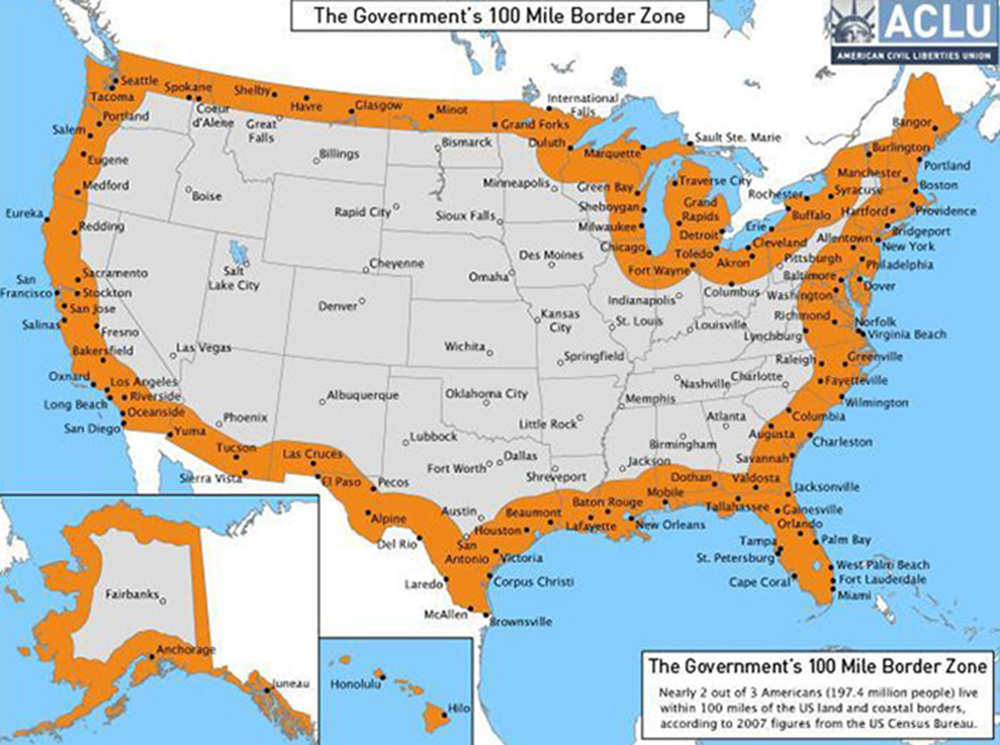By Chris Finnie
A lot of people saw a video, shot and posted by another passenger on a Greyhound bus in Florida, of a woman being pulled off the bus by U.S. Immigration authorities. The woman turned out to be from Jamaica, here to visit her new granddaughter. She had, in fact overstayed her tourist visa as so many visitors do.
But a lot of people wondered why immigration agents had boarded the bus in the first place, whether they could just ask anybody for papers anywhere, and why this was happening away from any land border with another country?
It turns out this happens all the time and we just didn’t know it.
Looking around, I found reports from Seattle, Maine, and upstate New York. I also found out why.
We live in a border enforcement zone
Legislation from 1946 gives agents the authority to search any vehicle near an “external boundary” of the United States, and subsequent regulations defined that area as within 100 air miles of a land or sea boundary. Border patrol agents also have the authority—granted to them by the Immigration and Nationality Act of 1952—to board and search for undocumented people on any vessels within U.S. territorial waters. Airports and other points of entry are also considered borders.
In addition, within the 100-mile zone, border patrol agents have the authority to set up “roving patrols.” These roving patrols are on the lookout for people committing crimes or immigration violations. They are essentially immigration checkpoints on wheels.
In case you were wondering, all of Santa Cruz County lies within this 100-mile zone from the Western sea border of the United States.
Rewire News points out that, “undocumented people do have the right to equal protection under the law and due process of law before they can be deprived of life, liberty, or property. And that’s because the due process and equal protection clauses in the Fifth and 14th Amendments apply to persons. Not ‘citizens.’ Not ‘Americans.’ Persons.” As the article notes, “The Constitution’s authors were clear: They knew the difference between “citizens of the United States” and “persons.” If they had meant to exclude anyone who was not a U.S. citizen from the protection of the due process and equal protection clauses, they could have made those clauses applicable to “citizens of the United States.”
However, according to the ACLU, “In this 100-mile zone, Border Patrol agents have certain extra-Constitutional powers. For instance, Border Patrol can operate immigration checkpoints.
At border crossings (also called “ports of entry”), federal authorities do not need a warrant or even suspicion of wrongdoing to justify conducting what courts have called a “routine search,” such as searching luggage or a vehicle. The regulations establishing the 100-mile border zone were adopted by the U.S. Department of Justice in 1953—without any public comments or debate. At the time, there were fewer than 1,100 Border Patrol agents nationwide; today, there are over 21,000.
The Border Patrol often ignores this regulation and rejects any geographic limitation on agents› authority. At least two federal circuit courts condone Border Patrol operations outside the 100-mile zone, federal regulations and Supreme Court precedent notwithstanding.
Federal border agents are stopping, interrogating, and searching Americans on an everyday basis with absolutely no suspicion of wrongdoing, and often in ways that our Constitution does not permit.
Border Patrol, according to news reports, operates approximately 170 interior checkpoints throughout the country (the actual number in operation at any given time is not publicly known).
The spread of border-related powers inland is inseparable from the broader expansion of government intrusion in the lives of ordinary Americans. For example, CBP claims the authority to conduct suspicion-less searches of travelers’ electronic devices—such as laptops and cell phones—at ports of entry, including international arrivals at airports.”
2/3 of the U.S. population does too
The ACLU says a surprising percentage of the country’s population lives in these border-enforcement zones. “Many people think that border-related policies only impact people living in border towns like El Paso or San Diego. The reality is that Border Patrol’s interior enforcement operations encroach deep into and across the United States, affecting the majority of Americans.
Roughly two-thirds of the United States’ population lives within the 100-mile zone—that is, within 100 miles of a U.S. land or coastal border. That’s about 200 million people. Connecticut, Delaware, Florida, Hawaii, Maine, Massachusetts, New Hampshire, New Jersey, New York, Rhode Island and Vermont lie entirely or almost entirely within this area. Nine of the ten largest U.S. metropolitan areas, as determined by the 2010 Census, also fall within this zone: New York City, Los Angeles, Chicago, Houston, Philadelphia, Phoenix, San Antonio, San Diego, and San Jose.”
Can it happen to anyone?
Legally, the Border Patrol can’t pull anyone over without “reasonable suspicion” of an immigration violation or crime. They can’t search vehicles in the 100-mile zone without a warrant or “probable cause.” They can’t pull over people based on their religion, race, national origin, gender, ethnicity, or political beliefs. Looking “foreign” or speaking with an accent is really not enough, even though it seems to form the basis for a number of stops according to news reports. And, while the Supreme Court has upheld the use of immigration checkpoints, these are only supposed to consist of a brief and limited inquiry into residence status. They can’t be primarily used for drug-search or general law enforcement efforts.
As for what anybody can do if immigration does stop you or show up at your door, this is what the ACLU suggests:
Don’t open the door. They must have a judicial warrant if they want to enter; and an administrative warrant for removal from the authorities isn’t enough. Ask them to slide it under the door.
If you’re given papers to sign, don’t. Call an attorney.
If you are stopped by immigration authorities, you do not have to answer questions about your citizenship. You have the right to remain silent, even at an immigration checkpoint, although a refusal to cooperate often leads to prolonged detention.
If you’re a citizen who wants to stand up to immigration authorities, asking them about their authority to ask for your documentation is an option. If you see them asking only people of color for their documentation, and you’re not a person of color, you could inquire why they are not asking white people for their status. And at checkpoints, you can decline to answer questions about your citizenship..


